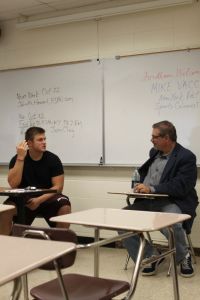
Mike Vaccaro spoke with students about how he developed his writing craft.
(Anthony Pucik/The Ram)
By Anthony Pucik
On Wednesday, Oct. 15, New York Post sports columnist Mike Vaccaro visited professor John Cirillo’s sports communication class to talk about everything ranging from how he got into journalism to the hottest current sports topics. He even did a mock interview with Roman Herman, GSB ’15, defensive lineman on the Fordham football team.
Cirillo introduced Vaccaro as a New Jersey native who embraced his New York identity and was full of “eloquent words [and] incisive comments” and “a New York treasure.”
A graduate of St. Bonaventure University, Vaccaro covered the Bonnies for the Olean Times Herald, was a columnist at The Star-Ledger, Kansas City Star and Times Hearld-Records and served as sports editor of the Northwest Arkansas Times before finally joining the New York Post in November 2002.
When asked how he got into sports writing, Vaccaro said he knew he wanted to be a journalist at a young age. On June 29, 1974, his father took him to Old Timer’s Day. He remembered witnessing his father cry over seeing former players Willie Mays and Duke Snider on the field, one of the few times in his life Vaccaro saw him cry. At the game, Vaccaro’s father pointed to the press box to show him where the media was located at the game. “And, at that moment I knew I wanted to do,” he said.
Vaccaro attributes a great deal of his accomplishments to his schooling and willingness to improve his writing. While at St. Bonaventure, Vaccaro said he “immersed” himself in campus media, getting involved in any way possible, which in turn greatly improved his writing.
“Writing is a muscle,” he said, “something that has to be tended to regularly.”
He also talked about columnists he looked up to as a kid and whose work he would always read in order to try and improve himself as a writer. Two specific writers he mentioned were Steve Serby, also of Post, and Mike Lupica of The Daily News. Vaccaro recalls how he wrote to Lupica about his work when he was in college and that Lupica was extremely helpful, willing to give him advice and asked him to send whatever he liked his way. “He was the perfect role model in terms of how to do the job,” he said.
The best advice Vaccaro said he could give to the students was to “get your nose in there and work … knowing how to write will get you a job at some point.”
Vaccaro likes to think that as he matured as a writer, he gained the ability to not only write well, but also very quickly (700-800 word articles in under half an hour on deadline). Vaccarro takes great pride in both of these things.
“I’m better than anyone faster than me and faster than anyone better than me,” he said.
Vaccaro also has a Fordham connection, attributing one of the greatest highlights of his life as a columnist to a column that was featured in the Post on Dec. 14, 2013 entitled “Fordham Football Keeps a Fan Named Vin Scully Tuned In.” He recalls asking to talk to Scully about the recent success of his alma matter’s football team for the column. When Scully got back to him, he was in his car on Canal St., and Vaccaro found it difficult to drive and somehow manage to keep notes at the same time.
Vaccaro said it would have been easy to come to Fordham and interview head football coach Joe Moorhead for the piece, but Scully brought in a different angle that would do a better job of drawing the reader. That was another bit of advice Vaccaro had for the students: to do their best to be unique in their writing.
“In this day and age you have to try and stand out,” he said, “Ask yourself ‘How can I be different?’”
But it is not all fun and games while writing a minimum of three times a week as a columnist, contrary to popular belief. Growing up a fan of the local New York sports teams and now having to write about them, Vaccaro says it is hard to maintain the balance between fandom and professionalism.
“I can’t watch a game the way I used to… you lose something,” he said. “You try to keep you fandom, but there comes a point where you have to detach.
Over time, Vaccaro has realized he is no longer a fan of teams, but “a fan of sports… a fan of fans, how they respond to my writing and how they react to their teams.”
You cannot forget what it means to be a fan, he said, because if you don’t care about what you are writing, it will show and people will not read it. He no longer roots from his favorite teams, but roots for good stories because he says he’s “measured by clicks… not paid to write art,” but to be read.
When asked about what he would have done if he did not get into the sports writing industry, Vaccaro said he would have been a teacher, but he is extremely happy with what he is doing. “I never know day by day what I’m going to see, what I’m going to hear,” he said. “If this is what you want to do it’s a blast.”
__________
Anthony Pucik is the Assistant Sports Editor for The Fordham Ram.

I do consider all of the ideas you have introduced to your post. They’re really convincing and will definitely work. Nonetheless, the posts are very quick for novices. May you please extend them a bit from next time? Thanks for the post.